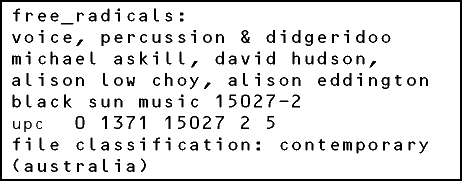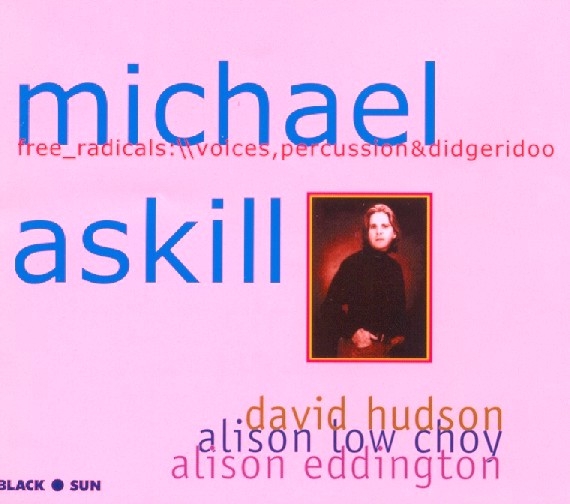|
|
||||||||||||||||||||||||||||||
 
Die australischen Ureinwohner verzichteten bewusst auf Ackerbau und Viehzucht. Das Land war ihnen heilig. Neuere archäologische Forschungen scheinen zu bestätigen, dass die Kultur der Aborigines, die sich u.a. in Felszeichnungen erhalten hat, gut 50.000 Jahre alt, der Kontinent jedoch wenigstens 176.000 Jahre von Menschen bewohnt ist. Das Hauptmusikinstrument vieler Aboriginesvölker, ein von Termiten hohlgefressener Eukalyptusstamm, erlebt bei uns im Westen unter dem Namen 'Didjeridu' (auch Didgeridoo, kurz „didge“) einen wahren Boom. Bei den Ureinwohnern hat das Instrument entsprechend den vielen verschiedenen Sprachen viele Namen. So simpel das Rohr aussieht - wird es von Könnern wie den Aboriginal-Musikern David Hudson, Matthew Doyle, Alan Dargin und Mark Atkins geblasen, entstehen Klangwelten von unerschöpflicher Vielfalt. An den Produktionen wirkten mit: Michael Atherton (Professor und Leiter/Gründer der Musikfakultät der Universität von Western Sydney), Steve Roach u.a Die Kompositionen des Perkussionisten entstanden in Zusammenarbeit mit David Hudson, Didjeridu, und den Perkussionistinnen Alison Low Choy und Alison Eddington während eines zweimonatigen Workshops mit dem berühmten australischen Choreographen Graeme Murphy und der Sydney Dance Company. Urzeitliche Stimmungen, Stimmen, Rhythmen. Traumzeit der Gegenwart. the projectFrom the dance production by choreographer Graeme Murphy and The Sydney Dance Company, Free_Radicals emerged in a most surprising way. The music envisioned would be performed by three percussionists on stage with the dancers who interact (in addition to their movement) with vocals and additional percussion. When the work began, there was no score, just the musicians and the dancers. Michael Askill, Low Choy and Eddington were creatively challenged with minimal instrumentation to produce new music at maximum speed and to find within themselves sufficient variety and invention to sustain a full evening production. Askill accomplished this by finding a common rhythmic language for both the dancers and musicians using number systems. This can be quite confusing in an environment based entirely on rhythm without obvious melody. These number systems became the basis for much of the music of Free_Radicals and the key for real interaction between the dancers and musicians. The title words, free and radical, are intended to capture the wildness of the music and dance. "The percussion is like the skeleton of the synchronized moments, you feel like the dancers are like little speakers, generating the sound that comes flying out of them," says Murphy. In this CD version of Free_Radicals David Hudson presents improvisations as an alternative to the choreographed interaction of the original stage version. The choice of didgeridoo may at first seem strange, yet Hudson (himself a dancer) is a master of an instrument which is arguably as old or even older than the drum. His improvisations on didgeridoo propel and embellish while (like a dancer) his vocalizations and chants create new forms and shapes.
the artistsProducer and composer Michael Askill is regarded by many as Australia's finest percussionist. He is a founding member and the Artistic Director of Australia's premier contemporary ensemble Synergy, a composer, producer, the Head of the Percussion Department at the Canberra School of Music, and finds time for collaborations and a solo career. Alison Low Chow has over ten years of orchestral experience and is currently Principal Timpanist with the Canberra Symphony Orchestra. Alison Eddington has performed with many Australian orchestras and ensembles, including the Sydney Symphony Orchestra and Synergy. biographydiscographytracklist
|
||||||||||||||||||||||||||||||
|
|
||||||||||||||||||||||||||||||
 |


